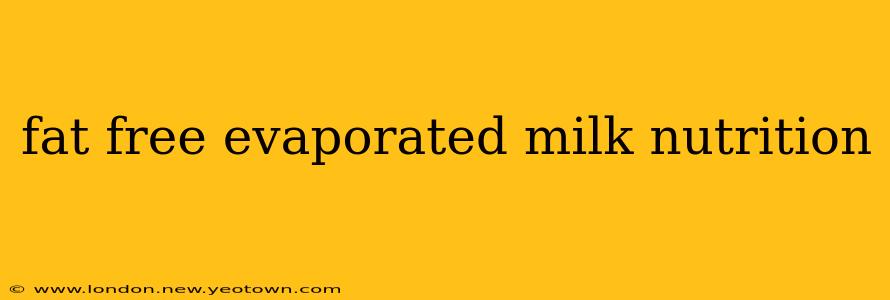Evaporated milk, that creamy, concentrated dairy staple, has found its way into countless kitchens worldwide. But what about the fat-free version? Is it a healthy swap, a diet-friendly alternative, or just another processed food? Let's unravel the nutritional profile of fat-free evaporated milk and address some common questions.
This isn't just a simple nutritional breakdown; it's a story of how a seemingly minor alteration – removing the fat – significantly impacts the nutritional landscape of this familiar ingredient. We'll explore its benefits, potential drawbacks, and how it fits into a balanced diet. Prepare to discover a whole new appreciation for this often-overlooked pantry item.
What is Fat-Free Evaporated Milk?
Fat-free evaporated milk is essentially whole milk that has had about 60% of its water removed through evaporation. Crucially, the fat has also been removed, resulting in a lower-calorie, lower-fat alternative to regular evaporated milk and even whole milk itself. This process concentrates the remaining nutrients, making it a surprisingly potent source of certain vitamins and minerals. Think of it as a concentrated powerhouse of dairy goodness, minus the fat.
How Does Fat-Free Evaporated Milk Compare to Regular Evaporated Milk?
The key difference, as the name suggests, lies in the fat content. Regular evaporated milk boasts a richer, creamier texture due to its higher fat percentage. This fat also contributes to a higher calorie count. Fat-free evaporated milk, on the other hand, sacrifices that creaminess for a leaner nutritional profile, offering fewer calories and less fat per serving. This makes it a popular choice for those watching their weight or seeking to reduce their saturated fat intake.
What are the Nutritional Benefits of Fat-Free Evaporated Milk?
Despite the fat removal, fat-free evaporated milk retains a healthy dose of essential nutrients. It remains a good source of calcium, crucial for strong bones and teeth. It also provides a decent amount of protein, contributing to muscle building and repair. Moreover, it contains various B vitamins, vital for energy metabolism and overall health.
Is Fat-Free Evaporated Milk Good for Weight Loss?
This is a question many dieters ponder. Because it’s lower in calories and fat than its full-fat counterpart, fat-free evaporated milk can be incorporated into a weight-loss diet. However, it's crucial to remember that weight loss depends on overall caloric intake and a balanced diet. Simply switching to fat-free evaporated milk won't magically melt away the pounds. A healthy lifestyle including exercise is vital.
What are the Potential Drawbacks of Fat-Free Evaporated Milk?
While generally considered healthy, fat-free evaporated milk does have some potential drawbacks. The removal of fat can impact its taste and texture, making it less creamy and potentially slightly thinner than regular evaporated milk. Some individuals might find the taste less appealing. Furthermore, while it contains some vitamins and minerals, it’s not a complete source of all nutrients. A balanced diet is still essential.
How Many Calories are in Fat-Free Evaporated Milk?
The calorie count can vary slightly depending on the brand, but generally, a ½ cup serving of fat-free evaporated milk contains around 40-50 calories. This is significantly lower than the calorie count of regular evaporated milk or whole milk.
Is Fat-Free Evaporated Milk Healthy?
The healthfulness of fat-free evaporated milk depends on the context of your overall diet. It can be a part of a healthy eating plan, providing essential nutrients like calcium and protein, with fewer calories and fat than full-fat options. However, it's important to consider it as one component of a balanced diet rich in fruits, vegetables, and whole grains. Over-reliance on any single food, even a healthy one, isn’t advisable.
How Can I Use Fat-Free Evaporated Milk?
Fat-free evaporated milk can be used in many recipes as a substitute for whole milk or regular evaporated milk. It works well in creamy soups, sauces, and desserts. It can also be diluted with water to create a milk alternative for beverages. Experimentation is key to finding your favorite applications!
In conclusion, fat-free evaporated milk offers a convenient and relatively healthy option for those seeking a lower-calorie, lower-fat alternative to regular evaporated milk. While it has its limitations, it can certainly play a valuable role in a balanced and nutritious diet when used mindfully. Remember to always check the nutrition label for specific nutritional information as values can vary slightly between brands.

